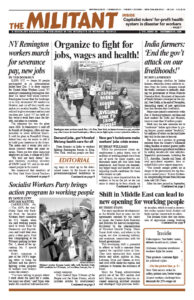The most significant developments in the Middle East in years are the agreements reached by the rulers in Israel, the United Arab Emirates and Bahrain for mutual recognition, facilitated by the administration of President Donald Trump. These Sunni Arab rulers, and others in the region, are also increasing military and economic connections with the Israeli government.
This developing shift is grounded in efforts to build a common front against the capitalist rulers in Iran. They have entrenched their armed forces and allied militias in Iraq, Lebanon, Syria and Yemen, as wars and civil strife shake the region, and continue to threaten the existence of Israel.
Since the Trump administration pulled out of the 2015 nuclear deal with Tehran, the regime there has resumed amassing enriched uranium and developed high-precision ballistic missiles, which it used in destructive strikes against Saudi Arabia’s oil fields and has shared with its allies.
The Iranian rulers fear any extension of opposition among working people at home to the deadly costs of Tehran’s military moves abroad. Facing worsening living and working conditions and the mounting toll of the rulers’ wars, hundreds of thousands joined protests over the last few years that were put down with brutal repression.
Following the Israeli government’s establishment of diplomatic relations with the rulers in the UAE and Bahrain this fall, Tel Aviv struck a deal with the government of Sudan Oct. 23 to take steps in the same direction. The first known visit by an Israeli top official to Saudi Arabia took place Nov. 22, when Prime Minister Benjamin Netanyahu met Saudi Crown Prince Mohammed bin Salman.
Talks are underway to end the three-year embargo imposed on Qatar by the rulers of Saudi Arabia, Egypt, Bahrain and the UAE, who say the government there was too close to Tehran. Washington sees the rift in relations between the Saudi and Qatari governments as a barrier to isolating Tehran.
These steps register the exhaustion of the decadeslong efforts by Arab rulers to treat Israel as a pariah government. Even though the governments of Jordan and Egypt signed peace treaties with the Israeli rulers in recent years, other Arab governments and leaders of the Palestinian National Authority sought to rally support from within the United Nations and the European Union for a continuing policy of no peace, no negotiations and no recognition of Israel.
The recent shifts deliver shattering blows to the efforts of Palestinian misleaders — both the PLO and Hamas — who have used these international ties to justify military provocations against Israel that have led to punishing retaliation from Israeli forces, a continual cycle of bloodshed and devastation.
Saudi Prince Bandar bin Sultan bin Abdulaziz, a prominent member of the ruling Saudi monarchy, criticized Palestinian spokespeople for refusing to see the pacts between Israel, the UAE and Bahrain as openings to pursue establishing a Palestinian homeland.
Addressing Palestinian officials for the first time Dec. 4, Israeli Defense Minister Benny Gantz urged them to resume talks with the Israeli government, promising aid and investments.
‘For recognition of Palestine and Israel’
These developments have the potential to open the door to transforming class relations in the region in the interests of the toiling masses.
A December 2017 statement by Socialist Workers Party National Secretary Jack Barnes points to “the political necessity for the Israeli and Arab governments and leaderships of Palestinian organizations to begin immediate talks to recognize both Israel and an independent Palestinian state.
“Negotiations to reach such an agreement must recognize the right of Jews everywhere to take refuge in Israel in face of the global rise of Jew-hatred and anti-Semitic violence, as well as the unconditional right of the dispossessed Palestinian people to a contiguous, sovereign homeland on territory — including East Jerusalem — conquered and occupied by the Israeli government during the 1967 war.”
This statement retains full force today. “It is along this road that working people of all national backgrounds, religious beliefs and political allegiances in Israel and Palestine can use and defend their space to speak, organize and begin redressing the blood-drenched legacy of imperialist domination and capitalist exploitation,” it says. The statement in full is available on the Militant website.
What comes next?
President-elect Joe Biden says he wants to overturn Trump’s decisions to pull the U.S. out of the Iran nuclear deal and to opt back in, as long as the Iranian rulers agree to return to full compliance with its restrictions. The rulers in Tehran say this may be possible, if the U.S. ends all its sanctions.
Writing in the Nov. 29 New York Times, liberal columnist Thomas Friedman warned Biden not to relinquish “the leverage of extreme economic sanctions on Iran” imposed by the Trump administration, unless Washington can force Tehran to halt its export of precision-guided missiles. These sanctions have disastrous consequences for the working people of Iran.
Friedman — who, like almost all pundits for the Times, has spewed venom against the Trump administration for the last four years — also had to acknowledge that his administration’s role in the agreements between Israel and a growing number of Arab states deserves Biden’s support. It was “Trump’s most significant foreign policy achievement,” Friedman said.
Within Biden’s Democratic Party there are forces calling for the destruction of Israel. On Nov. 29 Rep. Rashida Tlaib — a member of Democratic Socialists of America along with fellow Rep. Alexandria Ocasio-Cortez — posted, “From the river to the sea, Palestine will be free,” a slogan used by Palestinian misleaders who advocate the destruction of the Jewish state. Under pressure, Tlaib later deleted the posting.
“In the United States and other imperialist countries, organizations of middle class radicals claiming to be communist or socialist,” Barnes said in the 2017 SWP statement, “explicitly disavow any course to advance class solidarity among Palestinian, Jewish and other working people, often raising the reactionary cry, ‘From the river to the sea, Palestine will be free!’ This course to drive Jews out of the region disqualifies such groups from any moral or political legitimacy to speak as what Bolshevik leader V.I. Lenin more than a century ago called ‘tribune[s] of the people.’”
“We are for whatever renews our class solidarity and self-confidence, advancing us along a revolutionary course toward a united struggle for workers power,” Barnes said.

